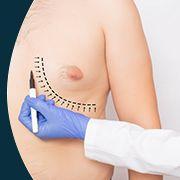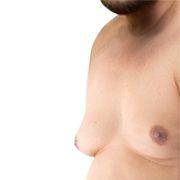Common Causes of Gynecomastia
In This Article
Common Causes of Gynecomastia
Pooja
Updated on November 19, 2024
Medically verified by Dr. Arya
Fact checked by Dr. Fazeela

Cosmetic
6 min read
Gynecomastia is a pathological process in which male breast tissue becomes enlarged. This is quite typical and can occur at any age and impacts a reasonable percentage of males.
The condition is not serious, however it results in anxiety, embarrassment, and a deleterious effect on one’s self image.
Are you struggling with gynecomastia? Wondering what can be the causes of this condition?
This blog by Mykare Health will talk about what is gynecomastia, what causes it and some of the things that may be learned from it.
What is Gynecomastia?
Gynecomastia is commonly known as being male breasts and refers to an enlarged breast area that has developed in the male due to breast tissues developing.
Though it is not a dangerous condition in the majority of cases, it may result in symptoms such as; pain, soreness, and where it can be mentally unpleasant at a certain level.
Gynecomastia should not be confused with pseudogynecomastia, adipose tissue in the breast tissue as a result of obesity or weight gain. The latter does not point to a literal glandular breast tissue growth but merely an enlargement brought by adipose tissues.
Causes of Gynecomastia
1. Hormonal Imbalance
Hormonal dysregulation is the most known cause of gynecomastia. In males, the hormone called testosterone reduces the impact that oestrogen has on breast tissue.
Sometimes due to low levels of testosterone or relatively high levels of oestrogen, tissues of the breast can develop. Such may be caused by ageing, puberty or some medical conditions such as tumours, cysts or even illnesses like anxiety or depression.
-
Puberty: Temporary gynecomastia may be a consequence of hormonal imbalance which is characteristic of puberty. The condition normally clears as soon as hormones become balanced.
-
Ageing: For masculine traits, testosterone levels reduce themselves gradually during ageing. With andropause this drop can result in a relative elevation in oestrogen levels, resulting in gynecomastia in older men.
2. Medications
Taking some medications can cause hormonal imbalance among men and lead to gynecomastia. These include
-
Antiandrogens: Flutamide, finasteride, and spironolactone are some of the medicines, which are prescribed for customers with prostate cancer or other diseases, have the impact on testosterone level and can cause breast tissue production.
-
Anabolic Steroids: Anabolic steroids are also used by bodybuilders or athletes and when the hormones are altered, gynecomastia occurs.
-
Antidepressants and Antianxiety Drugs: Certain antidepressants and antianxiety drugs including Selective serotonin reuptake inhibitors (SSRIs) decrease the level of hormones in the body.
-
Heart Medications: Further, gynecomastia can be precipitated by drugs including digoxin and calcium channel blockers.
-
Ulcer Medications: A drug in the management of ulcers and acid reflux known as cimetidine is-known to cause gynecomastia.
3. Substance Abuse
Substances which are used in the course of recreation in this form cause gynecomastia. These include
-
Alcohol: Alcohol also affects the liver and since alcoholics are likely to have liver problems they are most likely to affect the metabolism of hormones in the liver.
-
Marijuana: Marijuana, green plant, can be used in treatment or analysis of some diseases. It has the health risks and benefits and among the side effects is that regular use of marijuana raises oestrogen levels.
-
Heroin and Methadone: From the above list it can be seen that some of these drugs have an impact on the hormonal balances in the human body.
4. Health Conditions
Several health conditions can cause gynecomastia by impacting hormone production and metabolism
-
Hyperthyroidism: Hyperthyroidism is the upset of the hormonal equilibrium since the thyroid gland produces excessive amounts of thyroxine.
-
Kidney Failure: There are hormonal related symptoms one may develop gynecomastia which is a formation of breast tissues that is related to females while on a dialysis.
-
Liver Disease: Hormone modifying diseases like cirrhosis cause growth of breast tissue Since the enzymes regulating hormones in the liver are damaged, they lead to the formation of breast tissue.
-
Tumours: Tumours of Gestational Trophoblastic Diseases and Tumours of testes, adrenal gland and pituitary gland disturb the balance of testosterone and oestrogen.
-
Klinefelter Syndrome: Medical condition in males, where biochemical features include low level of testosterone, high level of oestrogen and karyotype which is XXXY.
 9 min read
9 min readThe Advantages of Choosing Mykare Health for Gynecomastia Surgery
 6 min read
6 min readIdentifying The Ideal Age For Gynecomastia Surgery
 6 min read
6 min readPre and Post Gynecomastia Surgery: Essential Things to Know
Get a Callback Now
5. Obesity
Obesity or more correctly obesity secondary to being over nourished, is a common problem in adults aged 60 and over and is related to reduced health span and life span as well increased morbidity, disability and health care costs.
Malnutrition and refeeding lead to hormonal imbalance and therefore cause gynecomastia. Moreover, one more thing that the overweight or obese person should also know is that when not well reduced there are tissues in the body that turn testosterone into oestrogen just like pregnant women; hence the growth of breast tissues.
6. Herbal Products & Supplements
They said that some of the metabolites in herbal products like tea tree oil or lavender contain plant estrogens that can disrupt the hormonal balance and become a cause for gynecomastia.
Symptoms of Gynecomastia
-
Swelling of breast tissue.
-
Sensitive or painful to the touch particularly in the breast area.
-
A mass or thickening under the nipple.
-
Growth of one bust line being larger than the other also.
Therefore, when you develop such symptoms, you should consult a doctor to be diagnosed with or without the possibility of developing male breast cancer that is rare.
Diagnosis and Treatment Options
The diagnosis of gynecomastia may be reached through physical examination, patient’s history and stories, as well as, imaging–ultrasound or mammography examinations. Blood tests may also be carried out in order to analyse levels of hormones.
Treatment options depend on the severity and cause of the condition
-
Observation and Monitoring: In cases where gynecomastia occurs due to puberty or hormonal imbalance in the body it may right itself and no treatment may be necessary.
-
Medication Adjustments: If this is due to medications you are taking, your doctor could recommend you to change to another product that does not lead to the development of breast tissue.
-
Hormonal Therapy: If the breast tissue enlargement is very severe, hormones such as tamoxifen which is a SERM can be prescribed.
-
Surgery: Medical alternatives such as liposuction surgery or the actual mastectomy particularly if pain is severe, gynecomastia leads to psychological issues, or other forms of treatment do not work.
Preventive Measures
While some causes of gynecomastia are beyond control, certain preventive measures can help reduce the risk
-
Avoid Drugs and Alcohol: The use of alcohol and other recreational drugs can reduce or be eliminated to lower the chance of developing the condition.
-
Check Medications: It is necessary to talk with your doctor when using any kind of medicines so that they explain which side effects are possible.
-
Maintain a Healthy Weight: They also recommended that weight loss could help reduce obesity as a cause of gynecomastia.
-
Monitor Hormone Levels: If a patient is on hormone therapy, then they will need constant check-ups as to no hormonal imbalance occurs.
Gynecomastia is a condition in which male breast tissue develops as a result of oestrogen/testosterone.
Hormonal conditions, medicines, are the pharma causes, while the mechanical or pathophysiological causes include diabetes, obesity, and impaired liver function.
Treatment includes close monitoring, medical management, and surgeries.
Counselling is important for patients, as this condition does affect them psychologically and can lower self-esteem.
Weight control, refraining from substances that might cause estrogenization and asking your physician about your medications can also minimise gynecomastia.



